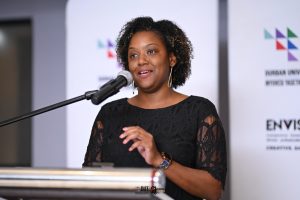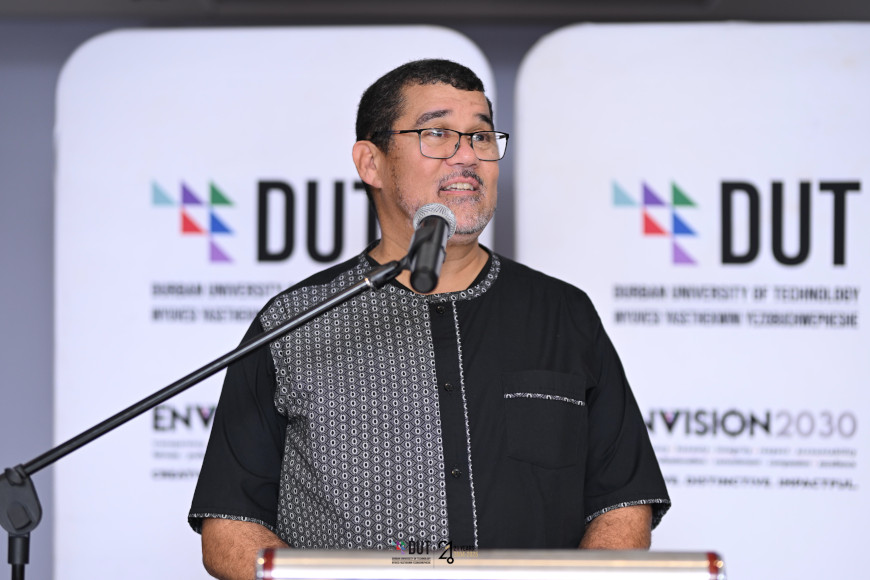The International Association for Research on Service-Learning and Community Engagement (IARSLCE) Conference 2025 brought together experts and scholars from all six continents around the world to discuss the latest developments in research on community engagement and service-learning.
The conference, which took place from 12 August 2025 to 15 August 2025, at the Coastlands Umhlanga Hotel in Durban, provided scholars, practitioners, graduate students and community representatives a forum to share published research and research-in-progress in the arena of the scholarship of engagement. The conference placed a strong emphasis on the value of impact, sustainability, and teamwork in developing the field and improving the lives and livelihoods of communities with whom universities around the globe engage.
The opening plenary of the conference on day one focused on South African perspectives on community engagement, highlighting some of progress made in South African scholarship in shaping the field. However, the plenary also acknowledged that community engagement in South Africa continues to grapple with perceptions of being an unfunded mandate. To address this challenge, a number of Vice-Chancellors, together with the Chief Executive Officer (CEO) of Universities South Africa (USAf), shared their insights on:
- Ensuring Sustainability: Strategies for ensuring the sustainability of community engagement initiatives
- Demonstrating Impact: Ways to demonstrate tangible impact on South African society
- Advancing Social Mission: Strengthening the role of community engagement in advancing higher education’s social mission
 Dr Rochelle Smarr, currently serving as a Chair of IARSLCE expressed her eagerness to lead the association in a year of reflection on its history, and draft a collective visionary roadmap for the future of IARSLCE that leverages the contributions of all members. She also extended her words of appreciation to the Durban University of Technology (DUT) for sponsoring the welcome dinner.
Dr Rochelle Smarr, currently serving as a Chair of IARSLCE expressed her eagerness to lead the association in a year of reflection on its history, and draft a collective visionary roadmap for the future of IARSLCE that leverages the contributions of all members. She also extended her words of appreciation to the Durban University of Technology (DUT) for sponsoring the welcome dinner.
Sharing her message on the gala dinner, Dr Smarr indicated that the dinner was a celebration of partnership between DUT, IARSLCE and the global community of scholars, practitioners, funders and students who not only have an interest in research for service-learning, but who believed in the power of service-learning and community engagement to transform lives.
“For 25 years, IARSLCE has been at the forefront of advancing research and practice that connects classrooms to communities and theory to action. Our mission has always been clear: to promote the development and dissemination of research on service-learning and community engagement internationally and across all levels of the education system,” she elaborated.
She further went on to thank DUT as hosts of the event. “Thank you for welcoming us into your home, your city, and your culture. To my fellow Board members and the IARSLCE leadership, thank you for your dedication and vision. And to all of you here thank you for your commitment to the work we do and for being part of this milestone moment in our association’s history. Here’s to a meaningful conference, new connections and the next 25 years of impact,” she said.
The second day of the conference kicked off with a celebration of a quarter of a century of impact in service-learning and community engagement (SLCE). The Global Scholars Panel brought together former and current IARSLCE board members to reflect on the organisation’s 25-year journey. The panel shared key milestones with reflections on the organisation’s achievements. Insights into the evolving field of SLCE and emerging trends as well as a glimpse into bold visions and ideas for a more inclusive, future-focused field.
The panel also explored how SLCE research continues to evolve, strengthening connections, deepening impact, and shaping communities worldwide. With voices from across the globe, the panel discussion highlighted the importance of collaboration and knowledge-sharing in advancing the field of SLCE.
Professor Darren Lortan, Head of Department: Mathematics at the Durban University of Technology and former Chair of the International Association for Research on Service-Learning and Community Engagement (IARSLCE), shared his background in community engagement and IARSLCE.
“I have been working in community engagement since 2011, starting locally in South Africa and expanding internationally in 2015. I have served on the board of IARSLCE since 2016. I was elected Vice-Chair in 2023 and Chair in 2024. During my tenure as Vice-Chair, I suggested hosting the conference in Durban, South Africa,” said Prof Lortan.
Prof Lortan also shared his definition of Community Engagement, saying it involves universities, stakeholders, and student administrators collaborating to identify and solve problems affecting both the community and the university, working together as equal partners.
Going forward, the objective of the IARSLCE Conference 2025 is to build more inclusive, equitable futures.
Pictured: Attendees at the IARSLCE Conference 2025.
Thubelihle Dumakhude/Waheeda Peters

